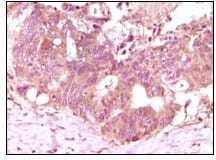
| WB | 咨询技术 | Human,Mouse,Rat |
| IF | 咨询技术 | Human,Mouse,Rat |
| IHC | 1/200 - 1/1000 | Human,Mouse,Rat |
| ICC | 技术咨询 | Human,Mouse,Rat |
| FCM | 咨询技术 | Human,Mouse,Rat |
| Elisa | 1/10000 | Human,Mouse,Rat |
| Aliases | BFGF; FGFB; HBGF-2; FGF2 |
| Entrez GeneID | 2247 |
| clone | 2H5G2C11 |
| Host/Isotype | Mouse IgG1 |
| Antibody Type | Primary antibody |
| Storage | Store at 4°C short term. Aliquot and store at -20°C long term. Avoid freeze/thaw cycles. |
| Species Reactivity | Human |
| Immunogen | Purified recombinant fragment of FGF2 expressed in E. Coli. |
| Formulation | Purified antibody in PBS with 0.05% sodium azide. |
+ +
以下是3篇关于FGF2抗体的参考文献及其核心内容概括:
1. **"Neutralizing anti-fibroblast growth factor 2 monoclonal antibody reduces cartilage degradation in collagen-induced arthritis mouse model"**
- 作者:Wang Y. et al.
- 摘要:研究证明,特异性靶向FGF2的单克隆抗体通过抑制FGF2信号通路,显著降低胶原诱导关节炎小鼠模型中的软骨降解和炎症反应,提示其在风湿性关节炎治疗中的潜在应用。
2. **"FGF2-specific antibody attenuates tumor growth by blocking paracrine signaling in triple-negative breast cancer"**
- 作者:Smith J.L., Chen H.
- 摘要:该文献报道了一种高亲和力FGF2抗体通过阻断肿瘤微环境中FGF2介导的旁分泌信号通路,抑制三阴性乳腺癌细胞的增殖和血管生成,显著延缓小鼠移植瘤的生长。
3. **"Role of FGF2 in cardiac regeneration: Insights from antibody-mediated functional inhibition studies"**
- 作者:Rossi F. et al.
- 摘要:通过使用FGF2中和抗体,研究揭示了FGF2在心肌细胞增殖和心脏损伤后组织修复中的双重调控作用,为心脏再生治疗提供了新靶点。
Fibroblast Growth Factor 2 (FGF2) antibodies are essential tools for studying the multifaceted roles of FGF2. a key protein involved in cell proliferation, differentiation, angiogenesis, and tissue repair. Also known as basic FGF (bFGF), this growth factor binds to fibroblast growth factor receptors (FGFRs) and activates downstream signaling pathways, including MAPK and PI3K-AKT, to regulate cellular processes. Dysregulation of FGF2 is linked to cancers, cardiovascular diseases, and fibrotic disorders, making it a significant therapeutic and diagnostic target.
FGF2 antibodies are generated against specific epitopes of the protein, enabling detection, quantification, or functional inhibition. Polyclonal antibodies recognize multiple epitopes, enhancing sensitivity for applications like immunohistochemistry (IHC) or Western blot (WB), while monoclonal antibodies offer high specificity for precise assays such as ELISA or flow cytometry. Neutralizing antibodies block FGF2-receptor interactions, useful in studying pathway mechanisms or exploring therapeutic interventions.
These antibodies are widely used in cancer research to assess tumor angiogenesis and metastasis, in regenerative medicine to evaluate tissue repair mechanisms, and in developmental biology to map FGF2 expression patterns. Species cross-reactivity (e.g., human, mouse, rat) and validation in specific experimental contexts are critical considerations. Researchers also employ FGF2 antibodies to investigate crosstalk with other signaling molecules, such as VEGF or TGF-β, providing insights into complex disease pathways and potential combinatorial therapies.
×